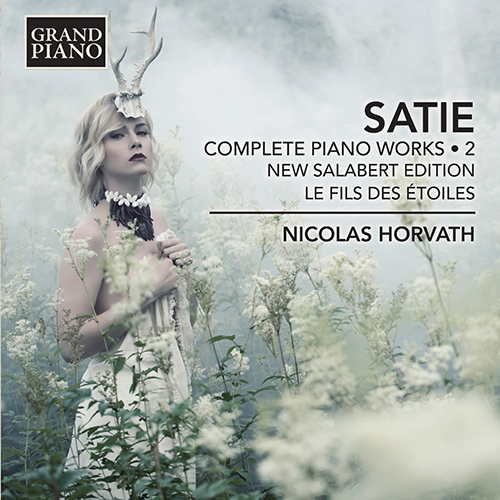
About this Release
“This recording is really unique and special because for the very first time Le Fils des étoiles has been performed on a piano from Satie's time and his own instrument maker of choice. Therefore, you could say that this album reconstructs what Satie must have had in mind when he composed this piece – that eerie sound quality, so uncommon and removed from a modern Steinway that somehow flattens the sounds of this weird and wonderful music. In addition, this recording presents the new Salabert corrected version, so double novelty, a double treat! Finally, the liner notes, thanks to Robert Orledge, are simply fantastic, full of unknown information and trivia about Satie!” — Nicolas Horvath
SATIE, ERIK (1866–1925)
Complete Piano Works • 2 (New Salabert Edition)
Le fils des étoiles
- Nicolas Horvath, piano
This second volume of Erik Satie’s complete solo piano music using Satie scholar Robert Orledge’s new Salabert Edition is devoted almost entirely to the enigmatic Le Fils des étoiles. Composed as incidental music for a play set in 3000BC, and announced as having ‘an admirably oriental character’, this is one of Satie’s longest scores and rarely heard complete. At its première the work, which comprises short juxtaposed sections as well as an attractive Gnossienne towards the end of Act I, ‘was met by an icy silence’!
This recording was made on a period instrument: Cosima Wagner’s Erard, model 55613 (1881)
Tracklist
|
Le fils des étoiles (1891) (01:18:00 )
|
|
1
Act I: Prélude, "La Vocation" * (00:03:53)
|
|
2
Autre musique pour le Premier Acte * (00:21:28)
|
|
3
Act II: Prélude, "L'Initiation" * (00:03:25)
|
|
4
Autre musique pour le Deuxième Acte * (00:20:59)
|
|
5
Act III: Prélude, "L'Incantation" * (00:05:10)
|
|
6
Autre musique pour le Troisième Acte * (00:18:38)
|
|
7
Fête donnée par des chevaliers normands en l'honneur d'une jeune demoiselle (1892) (00:03:08)
|
The Artist(s)
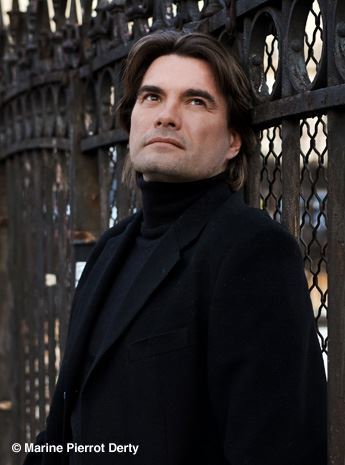 Nicolas Horvath began his music studies at Monaco’s Académie de Musique et de Théâtre Prince Rainier III and soon began to make an impression on a number of artists who would become his mentors. Aged 16 he caught the attention of the American conductor Lawrence Foster before coming to the notice of several distinguished international pianists, including Liszt specialist Leslie Howard. He is the recipient of numerous awards, including First Prize at both the Scriabin and the Luigi Nono International Competitions. He has become noted for hosting concerts of unusual length, sometimes lasting over twelve hours, such as the overnight performance of the complete piano music of Erik Satie at the Paris Philharmonie before a cumulative audience of 14,000 people. In 2019 he performed alongside Philip Glass at the same venue in a programme devoted to the American composer’s piano music. Horvath’s extensive and varied discography on Grand Piano includes the highly acclaimed Philip Glass solo piano music edition, Glassworlds; the complete piano works of Erik Satie; piano sonatas by the Estonian composer Jaan Rääts and music by the American experimental composer Alvin Lucier; Carl Czerny’s 30 Études; and lesser-known piano music by Claude Debussey, Anne-Louise Brillion de Jouy and Hélène de Montgeroult. Nicolas is a Steinway Artist.
Nicolas Horvath began his music studies at Monaco’s Académie de Musique et de Théâtre Prince Rainier III and soon began to make an impression on a number of artists who would become his mentors. Aged 16 he caught the attention of the American conductor Lawrence Foster before coming to the notice of several distinguished international pianists, including Liszt specialist Leslie Howard. He is the recipient of numerous awards, including First Prize at both the Scriabin and the Luigi Nono International Competitions. He has become noted for hosting concerts of unusual length, sometimes lasting over twelve hours, such as the overnight performance of the complete piano music of Erik Satie at the Paris Philharmonie before a cumulative audience of 14,000 people. In 2019 he performed alongside Philip Glass at the same venue in a programme devoted to the American composer’s piano music. Horvath’s extensive and varied discography on Grand Piano includes the highly acclaimed Philip Glass solo piano music edition, Glassworlds; the complete piano works of Erik Satie; piano sonatas by the Estonian composer Jaan Rääts and music by the American experimental composer Alvin Lucier; Carl Czerny’s 30 Études; and lesser-known piano music by Claude Debussey, Anne-Louise Brillion de Jouy and Hélène de Montgeroult. Nicolas is a Steinway Artist. The Composer(s)
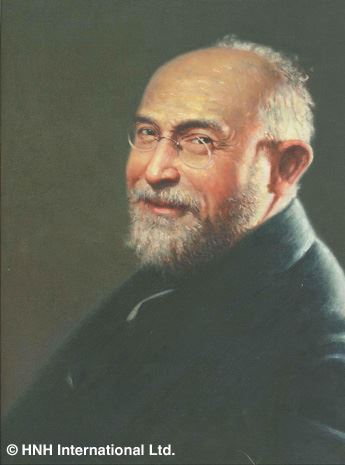 A French composer as eccentric in his way of life as in his music, Satie exercised considerable influence over some of his more distinguished contemporaries, including Debussy, Ravel and Poulenc, particularly through his tendency towards extreme simplicity. A number of his compositions have become very familiar to many, largely through their use in other contexts.
A French composer as eccentric in his way of life as in his music, Satie exercised considerable influence over some of his more distinguished contemporaries, including Debussy, Ravel and Poulenc, particularly through his tendency towards extreme simplicity. A number of his compositions have become very familiar to many, largely through their use in other contexts. Reviews
“…very well recorded. Everything was very well interpreted. Among the discoveries were the mesmerising mystical sounds of the Prélude du Nazaréen, as well as upsud. A future reference for this music.” – Musique classique & Co

“Nicolas Horvath presents a very inspired and poetic interpretation, performing on a splendidly sounding instrument.” – La Libre Belgique

“In all of these works, [Horvath] manages to distill and present all the attributes of the shy and lonely artist [Satie], with the piano as the medium for communicating this, based on simplicity, clarity, precision, elegance and economy of means.” – Ritmo

“In comparison with the fascinating version of Fils des Étoiles interpreted by Alexei Lubimov, Horvath plays up other aspects [of this piece]: clarity of motifs, a restrained transparency and a warm and wooded resonance” – Classica

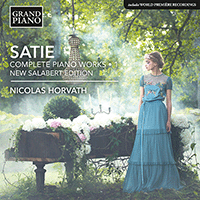
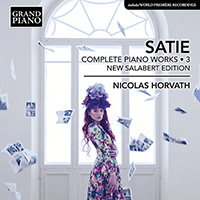
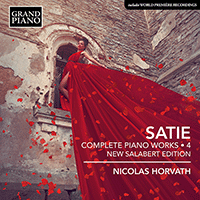
 Grand Piano has gained a reputation for producing high quality recordings of rare keyboard gems. Dedicated to the exploration of undiscovered piano repertoire, the label specialises in complete cycles of piano works by many lesser-known composers, whose output might otherwise have remained unknown and unrecorded.
Grand Piano has gained a reputation for producing high quality recordings of rare keyboard gems. Dedicated to the exploration of undiscovered piano repertoire, the label specialises in complete cycles of piano works by many lesser-known composers, whose output might otherwise have remained unknown and unrecorded.






